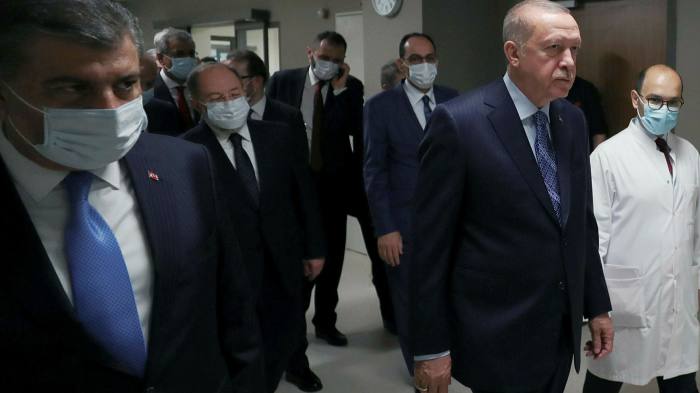Turkey’s battered finances have been shaken further by the coronavirus pandemic but President Recep Tayyip Erdogan remains determined to weather the crisis alone rather than request IMF help — something the populist leader has sworn he will never do.
Turkey has $169bn in foreign debt due in the next 12 months and gross foreign currency reserves, including gold, of only $84bn.
Those factors have spooked investors, sending the lira to a record low earlier this month and triggering warnings that Turkey could face a balance of payments crisis that would leave it with little choice but to seek international support.
But after the currency this month reversed some of its losses and a string of major banks successfully rolled over their debts, some analysts are asking whether Mr Erdogan might yet defy the warnings once again.
“I used to feel like the boy who cried wolf working on Turkey — or I did when I first came. I learnt to become more circumspect,” said Roger Kelly, an Istanbul-based economist at the European Bank for Reconstruction and Development. “I think there is a reasonable chance that ‘muddling through’ will save the day again as it has done in the past.”
The Turkish leader’s opposition to the “shackles” of the IMF stems from the narrative he crafts for himself as a strong leader who will not “bow down” before foreign powers and institutions — especially those in the west.
In 2018, a currency crisis triggered a recession and sharp spikes in inflation and unemployment, but Mr Erdogan refused to seek IMF assistance.
This time the crisis is global and half the world — more than 90 countries — has requested IMF support since the coronavirus pandemic began.
Yet the Turkish president last week indicated once again that he would not follow suit, as he accused the opposition of asking Turkey to repeat the “economic and political surrender” of years past.
His suspicion towards the Washington-based lender is shared by the Turkish public, 70 per cent of whom opposed striking an agreement with the fund, according to a recent survey by the pollster Istanbul Economics Research.
Optimists point to some signs that Turkey can get through the crisis alone. A string of major lenders, including the private banks Akbank and Is Bank and the state lender Vakifbank, have completed refinancing rounds worth billions of dollars. There have been no major corporate defaults.
The lira has steadied after authorities imposed measures aimed at preventing foreign investors from trading the currency. And while efforts to secure dollar liquidity from the US Federal Reserve appear to have failed, Turkey’s staunch ally Qatar last week agreed to bolster the country’s foreign currency reserves with the equivalent of $10bn in Qatari riyal.
Nonetheless, Goldman Sachs estimates that Turkey will still face a funding gap of roughly $20bn this year.
With government officials declaring the worst of the country’s outbreak over, Mr Erdogan is racing to revive sectors that generate hard currency, firstly by bringing back tourists.
“Turkey has a very strong commitment to open the country for tourism,” said Kadri Samsunlu, chief executive of the consortium that runs Istanbul’s main airport, who added that he was bullish about the outlook for the second half of the year.
While summer will be “a bit slow”, he predicted “a very good recovery” in the final four months of the year and played down the possible consequences of a second wave of the pandemic.
Bu Laura Pitel, Ankara
Excerpt only, to read the entire article, click here
Excerpt only, to read the full article, click here
You can follow our English language YouTube videos @ REAL TURKEY: https://www.youtube.com/channel/UCKpFJB4GFiNkhmpVZQ_d9Rg
And content at Twitter: @AtillaEng
Facebook: Real Turkey Channel: https://www.facebook.com/realturkeychannel/
